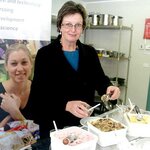
By playing it safe and using a two-pronged attack, a novel designer molecule, created and tested by an international team of researchers, fights malignant melanoma. The substance is similar to components of viruses in that they alert the immune system so the body's own defenses are also strengthened against cancer cells in the process. But it also puts pressure on the tumor in a different way; it switches off a specific gene in the malignant cells, driving them to suicide. With mice suffering from cancer, the researchers have thus been able to fight metastases in the lung, they…

